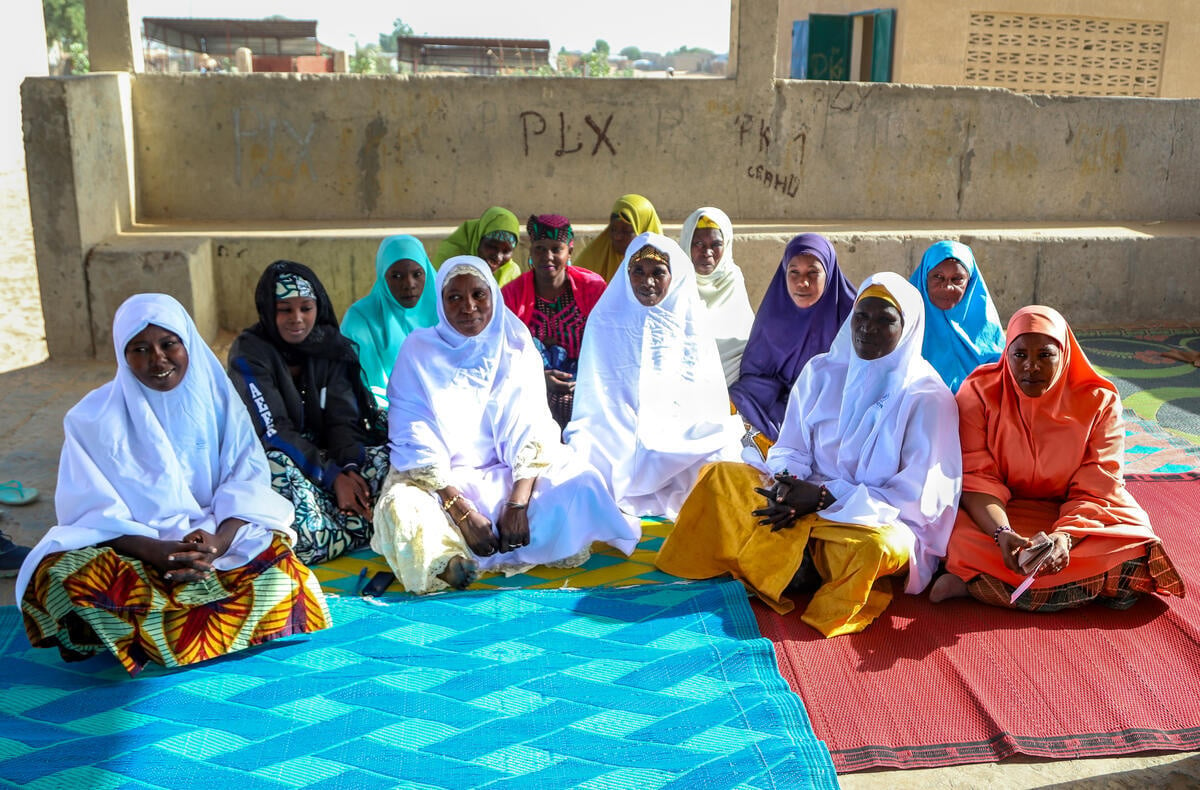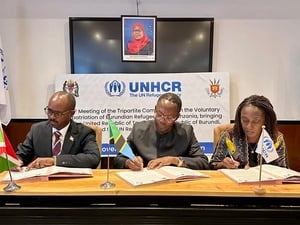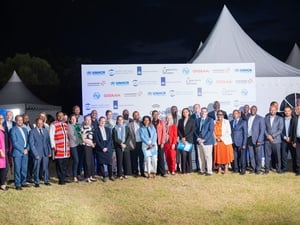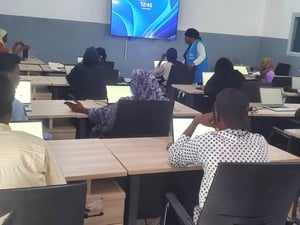Lafia Ouwar Jiki: the women turning displacement into a movement of solidarity in Diffa, Niger
Lafia Ouwar Jiki: the women turning displacement into a movement of solidarity in Diffa, Niger

Ousseina, an internally displaced woman from Djalori, Niger, sits with members of a women’s group she helped create in Awaridi, a settlement in southeastern Niger's Diffa region.
On the shaded veranda of a storeroom in Awaridi, a settlement in the city of Diffa in southeastern Niger near the Nigerian border, a group of women sit shoulder to shoulder on woven mats. The mid-morning sun presses in around them as they prepare for an awareness-raising session on violence against women and girls, one of many they’ve organized themselves.
“When we came here, we had lost so much. Now, we look after one another the way no one else can,” says 51-year-old Ousseina Manzo, exuding calm, confidence and warmth through her gentle voice and steady gaze.
In 2019, Ousseina fled violence in Djalori, Gueskerou commune in Diffa, with her children and found safety in Awaridi, a site now hosting over 28,000 Nigerian refugees, internally displaced persons, and returnees uprooted by attacks from non-state armed groups.
Determined to rebuild her life, she took the initiative to help launch a tontine, a micro-savings group where the women in the settlement began pooling their resources to support themselves.
“After everything we lost, I couldn’t just sit around and wait for people to come and help me,” says Ousseina. “I had to support my children, but I couldn’t do it alone. I thought, if we helped each other, it would be easier.”
What began as a simple savings scheme soon became a powerful force for solidarity, mutual support, and social transformation within the displaced community. As president of Lafia Ouwar Jiki, a Hausa phrase that roughly translates as well-being of the body, Ousseina now leads a network that brings together displaced, refugee, returnee, and host community women. They’ve formed 21 self-organized savings groups that have supported about 400 women and girls to start small businesses like beignet stalls or peanut oil production.
“Many of us in the network no longer receive humanitarian assistance,” says Mamie Mahamadou, a Nigerian refugee seated beside Ousseina, with a warm, confident smile. “But through the small businesses and other activities we carry out, we are doing okay.”
In 2024, the association received financial and technical support from UNHCR’s partner COOPI as part of efforts to prevent and mitigate the risks of violence against women and girls and strengthen self-reliance efforts. Fifty women received training to lead awareness sessions and work with their communities, not only to identify and reduce the risks of violence against women and girls, but also to engage with survivors in a supportive and informed way. Together with another refugee women’s association in Sayam Forage, a refugee camp about an hour away from Awaridi, they reached 2,000 people through sensitization sessions, community dialogues, and support to survivors.

Ousseina (center right, in white headscarf) sits with fellow members of a women’s savings group in Awaridi, a settlement in the city of Diffa, southeastern Niger. All of the women pictured are internally displaced persons who fled violence in their home villages near the Nigeria–Niger border.
Recent funding cuts have made renewing support for their activities in 2025 difficult. Despite this, the women of Awaridi have continued to organize awareness sessions, courageously including men and young people in group discussions that touch sensitive topics like early marriage and domestic abuse.
“When a woman needs help, we don't wait for someone else to act,” says Mamie.
“If a survivor needs urgent help, we mobilize our savings. We go with the woman if mediation with a spouse or parent is needed. We advocate with partners only when the need exceeds our means,” Ousseina adds.
Their commitment is especially crucial in a context where violence against women and girls remains a significant concern among forcibly displaced people. During the first three months of 2025 alone, 25 cases of violence against women and girls were reported among displaced populations in Niger, including rape, sexual assault, physical abuse, early marriage, and denial of access to resources.
“These women were a driving force for change in their community even before they received external support. What’s truly extraordinary is how they sustained and even deepened their impact after that support ended,” says Dupe Wundu, UNHCR’s Associate Protection Officer in Diffa.
“Their leadership and solidarity have become the backbone of the community. We want to learn from their experience and replicate this success in other sites, but for that to happen, we urgently need more resources to scale up, consolidate hard-won gains and preserve other community-based protection networks that are now at risk of collapsing without adequate support.”
Despite everything, the women of Awaridi choose connection. They celebrate baptisms and weddings and mourn losses together. Mamie proudly shares that her daughter is now married to Ousseina’s son, one of many unions between refugees and Nigeriens in Awaridi, a quiet but powerful sign of a community growing closer, not apart.
As the women on the veranda of the storehouse prepare to break into groups for their door-to-door awareness sessions for the day, Ousseina reflects on the impact the group has had in their community.
“In all my years, I’ve never seen a group bring as much hope as Lafia Ouwar Jiki. Thanks to our support for each other and the help of organizations, especially for economic empowerment, vulnerable women here are starting to believe in themselves again.”







![To improve access to sustainable energy and increase agricultural production for both refugees and their host communities, UNHCR is working with the Zambian authorities to connect all three refugee settlements in the country to the national grid. UNHCR has also supported the construction of value-addition centres in the settlements, which provide refugee farmers with various services such as storage, processing, packaging, and refrigeration to improve productivity and increase access to local markets, including the mining industry.“We are currently getting fruits and vegetables from refugee [farmers],” said Priscilla, community relations officer at Golden Camp Solutions, a private catering company that serves employees of Lumwana copper mine. “We are looking at a ton of cabbage a week and about 500 kilograms of tomatoes. There is no difference between a refugee supplier and a regular supplier.” Zambia. Zambian farm communities reap the benefit of giving opportunities to refugees](/africa/sites/afr/files/styles/d03_traditional/public/RF1442455.jpg?h=10d202d3&itok=8wPBFW9q)

